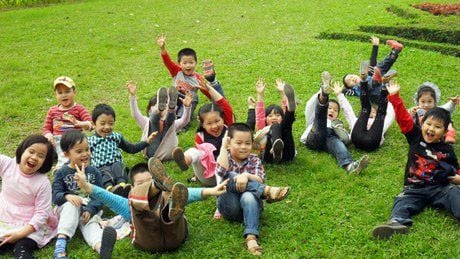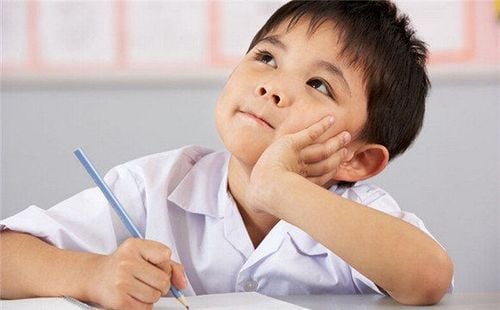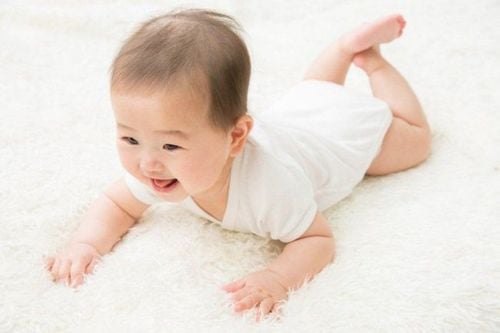This is an automatically translated article.
The article was professionally consulted by Doctor Ma Van Tham - Pediatrician, Vinmec Phu Quoc International General Hospital. He used to be a doctor in the Department of Emergency and Neonatal Resuscitation, Thai Nguyen Central Hospital, and a former lecturer in the Department of Pediatrics at Thai Nguyen University of Medicine and Pharmacy. Dr. Tham has strengths in the field of Internal Medicine: Respiratory, Digestive, Nutrition, Neonatal Emergency.Each stage of child development has different psychological characteristics. Below are psychological characteristics of children aged 1 to 6 years old.
1. Kindergarten age (13-36 months)
Children begin to walk, they can already explore their surroundings actively. From the 15th to 18th month, walking is stable, vision is expanded and hands are liberated. The hands begin to know how to use many common tools in the house such as spoons, cups, bowls... And gradually children understand the use of tools. Hands and fingers are increasingly skillful in using tools. However, the coordination of movements is not yet mature, so there are some redundant movements in action.
Walking is a basic condition to help children communicate more actively and widely. Children begin to separate from their mothers, but when they are tired or scared, they return to their mothers. The process of growing up with time, the distance from the mother will gradually increase and the child will not feel uncomfortable.
From 12-15 months, babies begin to talk. The language is gradually mastered. This is a very important feature, through speech children understand the intentions and attitudes of others, gradually forming symbols about things. When there is no object, say the child's name and understand.
As language develops, children not only touch things through sensations and movements, but also through language. Verbal communication gradually replaces motor communication, and communication with parents and groups of children will help children increasingly develop the communication process.
Thinking activities develop in parallel with sensory and motor activities. However, thinking is still closely associated with movements, not separating the world of things from thinking. Thinking is not logical. Thinking is egocentric. For example, three-year-olds talk to each other. At first glance they talked to each other, but when observing, each of them told a story as if they were only telling themselves, regardless of the actions or thoughts of the other. Jean Piaget calls them collective monologues
At this age, children consider themselves the center of their world, so in their thoughts and feelings, they only know themselves, not caring about reality. For example, children who ask for it, want it right away, refuse to share it with others, if they are not satisfied, they will cry. At this age, the child is still attached to his father - mother and siblings mainly.
Trắc nghiệm: Nhận biết sớm dấu hiệu chậm phát triển thể chất và trí tuệ ở trẻ
Nếu 6 tuổi không biết đếm số, 7 tuổi vẫn chưa phân biệt được giữa thực tế và tưởng tượng thì có thể bé chậm phát triển thể chất và trí tuệ hơn so với bạn bè cùng lứa. Bạn đã nhận biết được các dấu hiệu bất thường sớm này chưa? Cùng làm nhanh bài trắc nghiệm sau để trang bị thêm kiến thức cho mình nhé!
The following content is prepared under supervision of Thạc sĩ, Bác sĩ y khoa, Ma Văn Thấm , Nhi , Phòng khám Đa khoa Quốc tế Vinmec Dương Đông(Phú Quốc)
At this stage, children begin to try to be independent. Children can walk, talk, use the toilet on their own, and feed themselves. Self-control also begins to develop. Children who begin to discover and experiment on their own will run the risk of making mistakes when trying to explore new things. If the caregiver knows how to encourage the child, the child will become self-reliant and confident. If the caregiver is too protective of the child or opposes the child's independent actions, it will make the child doubt his abilities, feel ashamed of his desire to be independent.
Children's self-control is developed during this preschool period which will help them to successfully solve problems in the future. Therefore, parents need to set some requirements for their children, encourage them to do it themselves, especially in training children in the habits of defecation, urination and bathing, and at the same time should limit the activities of visiting children. danger detector. For example, children should not be allowed to play with fire, run into the street, throw dishes and chopsticks on the floor...
Children often do not accept such restrictions and often sulk. This phenomenon begins to appear in the 2nd year, when the child asks for something but is not granted. Some inexperienced mothers may be concerned that when their children are doing well, they suddenly have sulky patterns such as screaming, kicking, and flailing limbs.
However, such types of sulking only last for a short time and gradually children learn to accept what parents and others do not allow them to do. The process is much more favorable, if the parent and child have a strong loving relationship.
See more: New updates in the diagnosis and treatment of psychological disorders in children
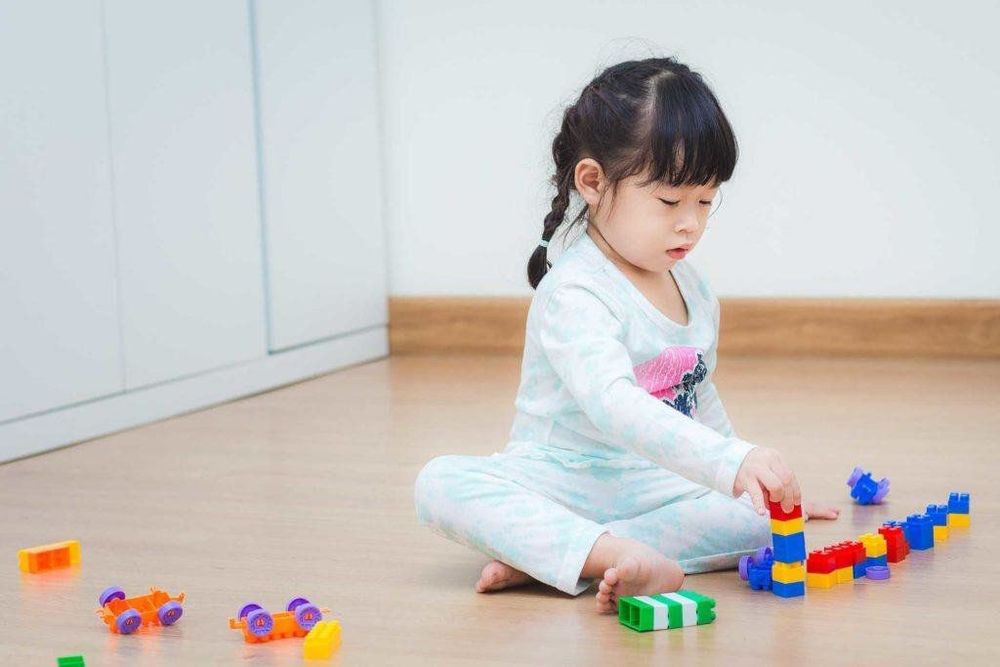
2. Kindergarten age (From 3-6 years old)
This is the most exciting period of human development.Development of intellectual function:
Children see things as a whole and know how to analyze and from details can synthesize and view things objectively. Language development: listening and speaking coherently and understanding long complex sentences. In the last years, use language to communicate fluently. Social relations:
This is the period of strengthening socialization, children learn to live as a member of the family, but at the same time, children also gradually expand their social relationships and begin to connect with those around them. young. Know your place in society, through your relationship with your parents, siblings and grandparents... Know how to address people. Gradually learn to pay attention to others, integrate in the group of friends.
Preschool children know how to accept the constraints of the objective world, the rules set forth by society, and know how to distinguish right from wrong. Therefore, know how to refrain from acting according to the rules. Thinking is fostered toward the imagination, so children can leave their caregivers eager to pursue adventurous, creative, and responsible activities.
If caregivers provide appropriate encouragement and discipline, children will develop a positive self-esteem and become more responsible and will complete assigned tasks. Children grow through their own experiences, thus allowing them to perceive the world around them in their own way. If children are not allowed to do so, children will feel guilty, do not dare to be independent, leading to children asking others to make decisions for them in all activities.
Gender awareness:
Through observing that there is a difference in the external parts of the two sexes, gradually distinguishing between boys and girls, children from 3 to 6 years old can accept the gender roles of the two sexes. and develop in that direction. Boys play shooting, sword fighting, horse riding... Girls play with dolls, cook... Children are also curious to observe their own genitals, other friends' genitals and touch... or ask questions. why did the mother give birth to the baby, where did she give birth...
Identified with the parents:
The son likes to imitate his father's actions. Daughter imitates mother. If for some reason, hindering the identity will lead to father-son conflict, mother-daughter conflict...
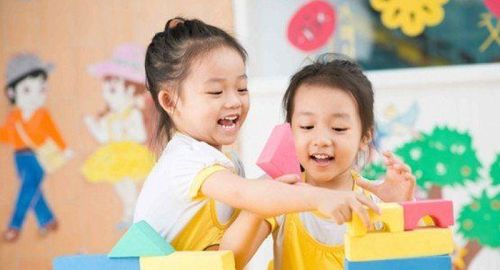
If the parent-child relationship lacks attachment, conflict or is too imposing, the child will hinder the development of the functions that cause fear for the child, and some forms of anxiety and phobia may appear. , disorder of adaptation....
Nurturing children's emotions is necessary, however, children in the developmental stage are also very susceptible to respiratory problems, infectious diseases. respiratory, skin diseases and gastrointestinal infections ... parents need to pay special attention to the care and provision of adequate nutrition for children. For children to be healthy and develop well, it is necessary to have a nutritious diet in terms of quantity and quality balance. If children are not provided with adequate and balanced nutrients, it will lead to diseases of excess or lack of nutrients, which adversely affect the comprehensive development of children in terms of physical, mental and motor skills.
Parents should supplement their children with supportive products containing lysine, essential micro-minerals and vitamins such as zinc, chromium, selenium, and B vitamins to help fully meet their child's nutritional needs. At the same time, these essential vitamins also support digestion, enhance nutrient absorption, help improve anorexia, and help children eat well.
Parents can learn more:
Signs of zinc deficiency in children
Micronutrient deficiency and failure to gain weight in children
Please regularly visit Vinmec.com website and update useful information to take care of your child. Take care of the baby and the whole family.
Recommended video:
"Early puberty in children - What should parents do?






